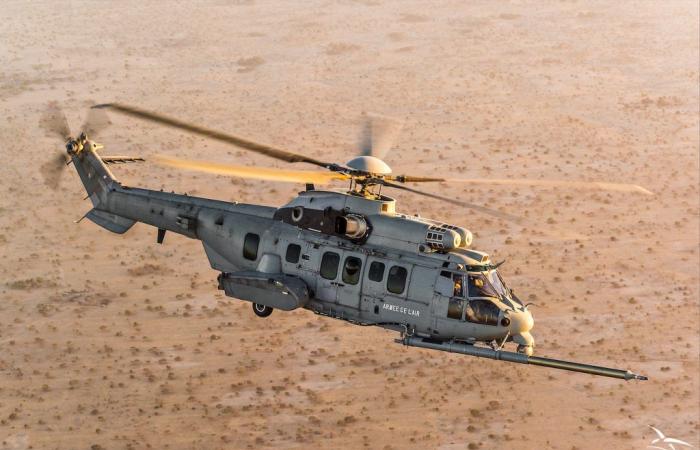
President Emmanuel Macron’s visit to Morocco is supposed to relaunch the military partnership between Paris and Rabat. This would be an opportunity to conclude juicy new contracts for French industry. A submarine and helicopters would already be the subject of “serious” discussions between the two countries, reveals the daily “La Tribune”. Morocco would be interested in Caracal helicopters, built by Airbus. Nearly 18 units would be the subject of negotiations, according to the same source. The contract could be worth up to 800 million euros. These devices are intended for the Royal Armed Forces and the Royal Gendarmerie. They should be produced at the Marignane and Brodes sites.
Intended for military transport, the Caracal is often used for rescue missions during combat as well as for light mobility of troops in hostile environments. It stands out for its capacity to transport a crew of 28 commandos, in addition to a team of caregivers. This aircraft gained a lot of notoriety among the general public when it appeared on the big screen in Tom Cruise’s famous blockbuster “Mission: Impossible: Fallout”, a large part of which was filmed in France.
It should thus strengthen the air arsenal of the Royal Air Forces which have been working for years to modernize their fleet of helicopters, whether combat or transport. In this segment, Morocco seems to be diversifying its choices. This is evidenced by the order placed with the Brazilian manufacturer Embraer for the C-390 Millennium transport planes.
Submarines: France faces Korean competition
Furthermore, Franco-Moroccan talks extend to the naval domain. Morocco would be willing to buy a first submarine without definitively opting for the supplier. The Kingdom remains divided between French technology, embodied by Naval Group, and South Korean competitors Hanwha and Hyundai who, according to La Tribune, have offered less expensive submarines with technology as sophisticated as that proposed by the French.
Paris awaits its retribution!
“Armament is 50% military and 50% geopolitics,” recalls a former French general who explains that the political situation is decisive in military cooperation. This order comes in a context of romance between Rabat and Paris who are preparing to officially seal their reconciliation during President Emmanuel Macron’s visit to Morocco. Scheduled for the end of October, the presidential trip is the culmination of a long journey of warming between the two countries after an unprecedented diplomatic quarrel.
The Tenant of the Elysée is going to the Kingdom at the invitation of HM the King as part of a state visit after he finally resolved to support the Moroccan character of the Sahara in the letter he sent to the Sovereign on the occasion of the Feast of the Throne. In summary, he clearly said that the present and future of the Sahara are in no way imaginable outside of Moroccan sovereignty. Macron did what Morocco had long expected from one of its closest allies: a clear and unequivocal alignment on the full sovereignty of the Kingdom after years of positioning in a sort of very accommodating gray zone for Paris which was careful not to offend Algeria by its too visible support for Morocco. This clarification paved the way for the relaunch of the Paris-Rabat axis. Among the French, we hope to rebuild a new partnership for the next 25 years. This is what the French ambassador, Christophe Lecourtier, told “L’Opinion” in a recent interview.
We are no longer on conquered territory!
This new idyll arouses the appetite of French businessmen. It is also an opportunity for French defense manufacturers to make their comeback in Morocco’s list of suppliers after years of marginalization to the benefit of American manufacturers who monopolize most of the loot.
The FAR buys nearly 90% of its weapons from the United States. France’s position has continued to diminish, especially after the entry on the scene of new suppliers with great strike capacity such as the Israelis, the Turks and the Chinese.
However, Franco-Moroccan military cooperation stands the test of time. This is evidenced by the success of some recent contracts such as that of Caesar cannons.





